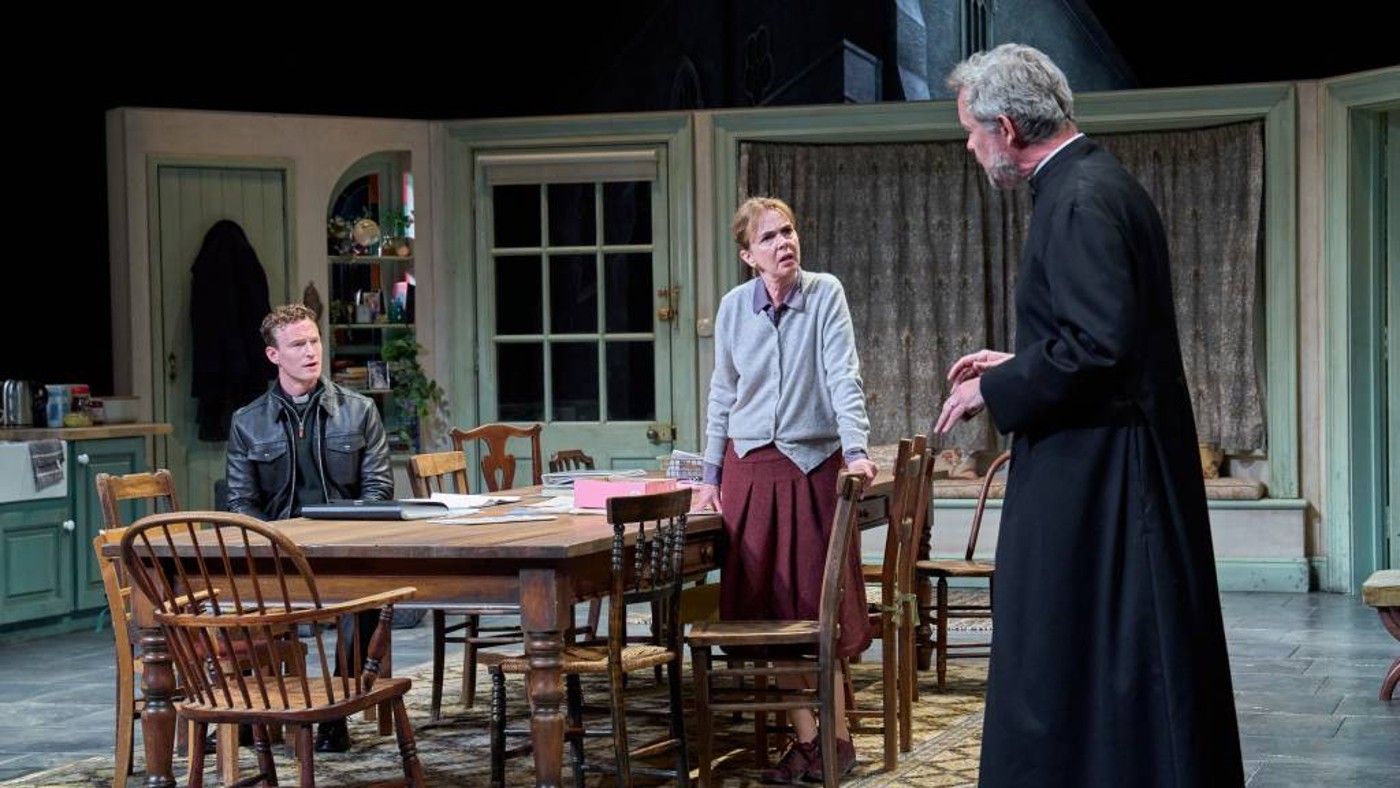The Southbury Child review: this play feels almost ‘heaven-sent’
The piece is deftly directed by Nicholas Hytner and stars three-time Olivier winner Alex Jennings

A free daily email with the biggest news stories of the day – and the best features from TheWeek.com
You are now subscribed
Your newsletter sign-up was successful
“Blissfully funny and ineffably touching”, Stephen Beresford’s new play about an Anglican vicar wrangling with his “mutinous” flock would have “worked wonders” with audiences had it reached the stage when it was supposed to, in 2020. Now, after two years of “biblical upset”, it feels almost “heaven-sent”, said Dominic Cavendish in The Daily Telegraph.
Alex Jennings plays David, a vicar in Dartmouth who has dug in his heels over a request from a grieving family to decorate his church with Disney balloons for their little girl’s funeral. His apparently “snobby callousness” enrages locals, leading to a stand-off “so tightly enwoven with competing principles and conflicting emotions”, it creates “an almost Ibsenite intensity”.
Yet the play’s wry tone, and its “dexterous” mix of light and dark, “puts you more immediately in mind of Alan Bennett”. It’s beautifully acted and profound, and has a “tear-stirringly cathartic” ending: it’s “my play of the year so far”.
The Week
Escape your echo chamber. Get the facts behind the news, plus analysis from multiple perspectives.

Sign up for The Week's Free Newsletters
From our morning news briefing to a weekly Good News Newsletter, get the best of The Week delivered directly to your inbox.
From our morning news briefing to a weekly Good News Newsletter, get the best of The Week delivered directly to your inbox.

The piece is deftly directed by Nicholas Hytner, and three-time Olivier winner Jennings is “majestic” as David, who turns out to be a more complex and flawed figure than he first appears, said Clive Davis in The Times. Indeed, there are first-rate performances from the entire cast, including Phoebe Nicholls as David’s disenchanted yet dogged wife, and Sarah Twomey as the bereaved mum.
At times, the writing becomes too “cluttered”, as if you are “watching a soap opera at warp speed”. But the whole adds up to a “rare and heartfelt” portrait of post-Christian Britain; it is one of those plays that “keeps you talking well into the night”.
Alas, the piece has a fatal flaw: the central dilemma just isn’t entirely credible, said Ryan Gilbey in The Guardian. Jennings is “delightfully witty and urbane” as David, and you just can’t quite believe that this equable man would be so intransigent in the face of devastating grief.
Agreed, said Patrick Marmion in the Daily Mail. This is a good play, but with “fewer gags” and tighter plotting, it could have been even better.
A free daily email with the biggest news stories of the day – and the best features from TheWeek.com
Bridge Theatre, London SE1. Until 27 August
-
 Elon Musk’s pivot from Mars to the moon
Elon Musk’s pivot from Mars to the moonIn the Spotlight SpaceX shifts focus with IPO approaching
-
 ‘Hong Kong is stable because it has been muzzled’
‘Hong Kong is stable because it has been muzzled’Instant Opinion Opinion, comment and editorials of the day
-
 Magazine solutions - February 20, 2026
Magazine solutions - February 20, 2026Puzzle and Quizzes Magazine solutions - February 20, 2026
-
 Catherine O'Hara: The madcap actress who sparkled on ‘SCTV’ and ‘Schitt’s Creek’
Catherine O'Hara: The madcap actress who sparkled on ‘SCTV’ and ‘Schitt’s Creek’Feature O'Hara cracked up audiences for more than 50 years
-
 6 gorgeous homes in warm climes
6 gorgeous homes in warm climesFeature Featuring a Spanish Revival in Tucson and Richard Neutra-designed modernist home in Los Angeles
-
 Touring the vineyards of southern Bolivia
Touring the vineyards of southern BoliviaThe Week Recommends Strongly reminiscent of Andalusia, these vineyards cut deep into the country’s southwest
-
 Nan Goldin: The Ballad of Sexual Dependency – an ‘engrossing’ exhibition
Nan Goldin: The Ballad of Sexual Dependency – an ‘engrossing’ exhibitionThe Week Recommends All 126 images from the American photographer’s ‘influential’ photobook have come to the UK for the first time
-
 American Psycho: a ‘hypnotic’ adaptation of the Bret Easton Ellis classic
American Psycho: a ‘hypnotic’ adaptation of the Bret Easton Ellis classicThe Week Recommends Rupert Goold’s musical has ‘demonic razzle dazzle’ in spades
-
 Properties of the week: houses near spectacular coastal walks
Properties of the week: houses near spectacular coastal walksThe Week Recommends Featuring homes in Cornwall, Devon and Northumberland
-
 Melania: an ‘ice-cold’ documentary
Melania: an ‘ice-cold’ documentaryTalking Point The film has played to largely empty cinemas, but it does have one fan
-
 Nouvelle Vague: ‘a film of great passion’
Nouvelle Vague: ‘a film of great passion’The Week Recommends Richard Linklater’s homage to the French New Wave